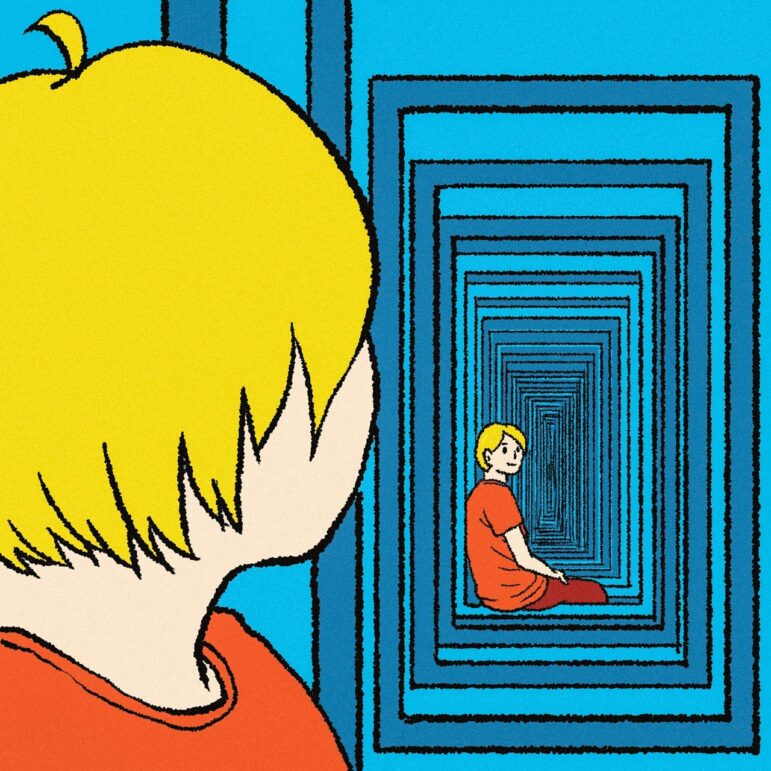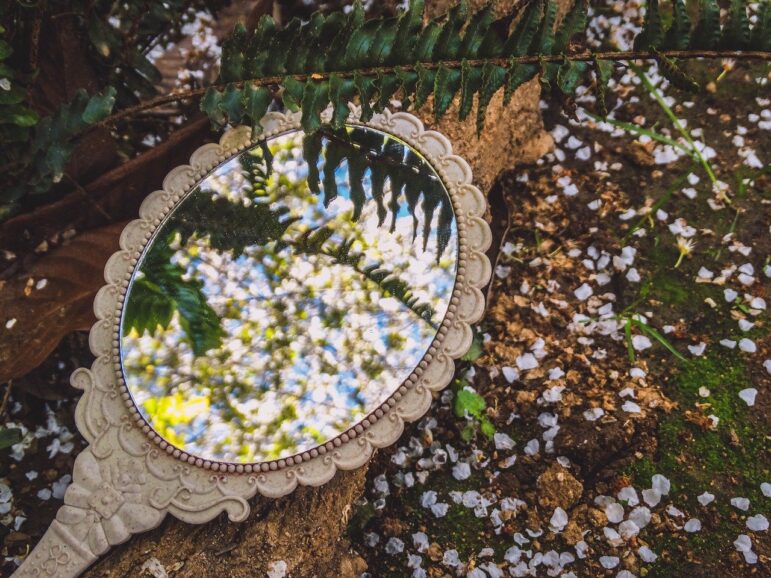
My memories of childhood are hazy. Those that remain have either taken up the shine of legend or been driven like nails to hold up the shape of me. These are the ones I do not tell, the moments of no story that changed the child I was in ways they could not understand. Most often, I forget them until some realization or some emotion brings them back with a clarity of tone across three decades.
Here’s one. I am in school, sitting near a window. The color of the building, and the shape of the desk, tell me that it is no later than fourth grade. There is an argument about whether the room is too hot, and I do not understand why. Someone asks me if I want the air turned up, and I shrug. “I’m pretty much always fine,” I say. “It would have to be a lot more hot or cold for me to care.” Someone frowns. I have said the wrong thing.
Here is another. I am home sick, a low grade fever and a headache. The living room has wood panel walls and the Tylenol is an imposition that keeps me from the much more interesting parts of being out of class. Later, my mother comes in to ask if the medicine is helping. I look up from my book, confused. “I don’t know,” I tell her. “Am I better?”
There are a dozen more like this, fractured moments when I realized that other people thought about themselves in a way I didn’t. They noticed things that happened to their bodies and, more terribly, could explain why their emotions were reacting in certain ways or how they had changed over time. I was young when I realized that there was an entire set of internal data that, by circumstance or nature, I struggled to notice and could not fathom how to read.
My focus, even then, was external. I loved people and their stories, and I was always working to understand them better. I had elaborate networks that helped me understand the world – at least, the external world that I moved through and saw as most important.
In some ways, my life has been the work of jury rigging those systems and building roads into the place that it seems most other people live. I am trying to know myself.

A figure with blond hair looking into an infinite mirror [愚木混株 Cdd20, Pixabay]
The man who taught me magic set that as the first priority. “You’re going to journal,” he said, pipe smoke and his rocking chair lending an air of homeliness to a task I had loathed in school and avoided elsewhere. “You’re going to make lists – things you like, things you don’t like, things you see every day. We’ll use them later. For now, I just want you to notice.”
The words dragged out like homework, litanies and lists until I could not think of anything else to say. I practiced accessing the small and constant watcher in myself and asking it to report back its findings, but the answers came back faint or garbled. I tried writing my dreams and caught only a line or two, sometimes less. “Grail in the garbage?” I wrote, already confused. Things that seemed automatic – I like spaghetti, I dislike lasagna – were much harder to remember outside of context, much harder to pin down. Did I dislike lasagna, or did I just ignore it in favor of better options? What was this meant to do with my practice?
It was far easier, and far more immediately pleasant, for me to reach outside of myself. I had been reading tarot already for years, and the satisfaction of those moments when I found myself looking through and past the cards into the web of details that the answers came from – that seemed like magic. Even more, as a spirit worker I found joy and comfort in my conversation with those who were – mostly, a majority of the time – outside of me. Turning internal seemed pointless and, worse, lonely.
Internal work was for therapy, I decided. I would throw myself into relationships and learn more about myself through my dealings with the gods.

A hand-mirror looking up at petals in branches above it [Romina BM, Pixabay]
To be clear, it worked for a time. It worked in the way that parenting is meant to work, with structured lessons that impart knowledge while keeping the child mostly safe. But what worked better, unexpectedly, was writing.
At least it started with writing. Roleplay, too, and other games – any kind of storytelling that required me to make someone of whole cloth and think closely about them. I was aware, in theory, that writing a character was at least partially internal work. My theology about it drifted back and forth: how much of my writing was inspired? What did inspiration mean? But in order for my characters to live I pulled from my knowledge of sensation, my experiences of the world, my understandings of development. Often the act of writing was unplanned, an uninterrupted flow towards the page from some unknown source. It was only later, reading back, that I would realize how much of me was carried in that river – and so I started to learn about myself.
There are times that I have thought about it as a mirror, planted in the heart of me and throwing out reflections of different pieces. Here is Tabea, 18, struggling to understand her world and how to love. Here is Molly, 25, working to define herself against the shadows of her parents. Here is Mote, immortal, realizing that the careful balance she has kept for her own safety covers up a well of anger. Here is Max, 23, sure that he is the only thing that can save the world and ruining himself to try. Here is Jack. Here is Wimmarc. Here is Rob. I have given my beloveds my writing as an invitation, written with my friends as intimacy. Even with strangers, I see my writing as an invitation to get to know me.
When my therapist suggested that we try Internal Family Systems for a while, I nearly laughed. “Sure,” I agreed, “I know those guys.” As our work continued, I realized that while the process was similar, it was a different mirror than the one I had been using. The people we discussed were not my characters – there was no good place for them to fit inside this new paradigm – but instead archetypes carved out of myself. “This person, who takes care of the rest of you,” my therapist would ask. “What do they need? Why are they afraid?” Or, “If there is a part of you who is still a child, what sort of care would you hope they get?” This time, the questions gave me a sense of vertigo or felt like speaking in a new language, but I could answer them.
Better, I could sit down and discuss the answers with the pieces of myself. It felt different than the times where I went elsewhere, closed my eyes and journeyed out to talk to deities or other spirits, but the structure was the same. Instead of out, I set my path inward, and started mapping out a landscape that felt personal and private, navigable only by me. My home was hidden and warded, and only a few were allowed inside its shifting walls. I, however, could splinter myself into as many pieces as I liked and, in that safety, hold a court of me.
After all of the work of outwards travel and discernment, this seemed easy, but I very seldom did it. The energy I had was still directed outward, managing the relationships in my life as first priority. I so seldom felt prepared for the harsh criticisms and unpleasant truths I had to tell myself. And so the house fell into disrepair.
Still, the idea did not go away. My communities began to talk about Winifred Hodge Rose’s Soul Lore, which suggested a mirror in which every person is actually a collaborative project of nine souls working together, each with their own priorities and personalities. My best friend and I discussed daemonism, a practice based on the His Dark Materials series in which you become your own companion, entirely separate and yet fundamentally the same, to know yourself better. I read books that talked about the nemet, the Holy Guardian Angel, the fetch, and slowly I began to get the point.
In the end, life forced the issue. When that didn’t work, it did it again. Turned externally, unaware of my own needs and preferences, I slammed past my boundaries, exhausted my reserves, and was left hollow. I hurt without having the words for why. I pursued the things I thought were right without a care for whether I had anything to give, and had no tools to fix the damage that I dealt myself. I did not know what I needed, and so I could not tell others until it was too late. Cracks appeared in the foundation and grew so big that finally I had to stop.
“Hey gang,” I said, crouched on the floor, my hands on either side of a crevasse that had opened in the core of me. “What do we do about this?”
Slowly, I began to hear the answers.

A shadowy figure in a triangular hallway made of mirrors [Roderick Qiu, Pixabay]
The Two of Cups before me is a woman with long red hair. She is standing submerged to her waist in water, looking down at her reflection. Her hand reaches down – her reflection reaches up – and their fingers almost touch on the surface of the water. She is flanked, in this reading, by the Moon – a figure climbing out of the water on a ladder, both shadowed and turned from the viewer – and the Two of Pentacles. The man there is on dry land and laughing, balancing a violin in his hands with a banjo slung across his middle and a drum set on his back, the sticks hooked up to strings so that he can play it with his legs.
There is a joyful balance here that I am still seeking. There is knowledge and replenishment that comes from inside that I have yet to truly access. I am afraid. This work is difficult for me. But I have a house of mirrors, and a love that drives me back towards home.
The invitation is the same as ever, but this time I send it to myself: “come in, and know me better.”
The Wild Hunt is not responsible for links to external content.
To join a conversation on this post:
Visit our The Wild Hunt subreddit! Point your favorite browser to https://www.reddit.com/r/The_Wild_Hunt_News/, then click “JOIN”. Make sure to click the bell, too, to be notified of new articles posted to our subreddit.